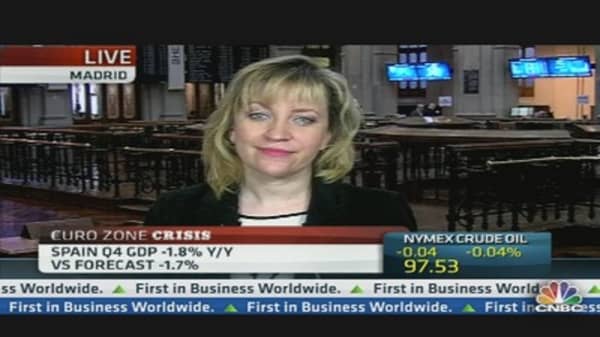With record unemployment figures, a fractious political scene, years of declining retail sales and Wednesday's depressing growth data, Spain appears to be sinking. Yet an improvement in risk appetite and falling borrowing costs continue to prop up the economy.
Spain's gross domestic product (GDP) fell 1.8 percent in the fourth quarter from a year earlier, preliminary data from the National Statistics Institute showed on Wednesday. The news came a day after Spain's retail sales dropped 10.7 percent over the Christmas period, compared to a year ago. In all, retail sales have fallen for 30 consecutive months, a decline blamed on a hike in the value added tax (sales tax).
Speaking to parliament after the data was released, the Spanish prime minister Mariano Rajoy pledged to unveil stimulus measures shortly. A government spokesman told CNBC said these measures could be announced as early as Friday.
(Read More: Spain 'Disconnect' as Bonds Rally and Jobless Rate Surges)
Economist Sara Perez-Frutos, country manager at Brunswick Capital, told CNBC's "Worldwide Exchange" that the stimulus measures were essential.
"We are waiting, we are waiting and hoping that these new measures could be really strong and positive," she said, adding that a cut in taxes for new and small to medium-sized businesses could help promote growth.
"The key point is what Prime Minister Rajoy is going to say to investors - we have problems in the banking sector, such as those with Bankia, we have problems with the preference shares and we have problems with the bad bank. We need solutions," she said.
Spain's two main political parties have agreed on a plan to compensate thousands of savers who invested in preferred bank shares, such as those of Bankia and other distressed banks. These savers lost most of their investment after the housing crash created 184 billion euros worth of toxic real estate assets.
Four of the country's largest lenders were recapitalized in 2012, receiving 37 billion euros ($49.8 billion) from the European Union. However, James Ferguson, founding partner at Macro Strategy Partners believes that more money could be needed by the banks.
"Once you get into a systemic crisis and real estate prices start to fall, you need to create a floor - a clearing price in real estate. You need someone out there to be lending to the buyers at the foreclosure auction…[However not] all the banks are trying to shrink their loan books and none of them want to lend," Ferguson told CNBC.
(Read More: Spain Bank Audit Brings Relief, but for How Long?)





